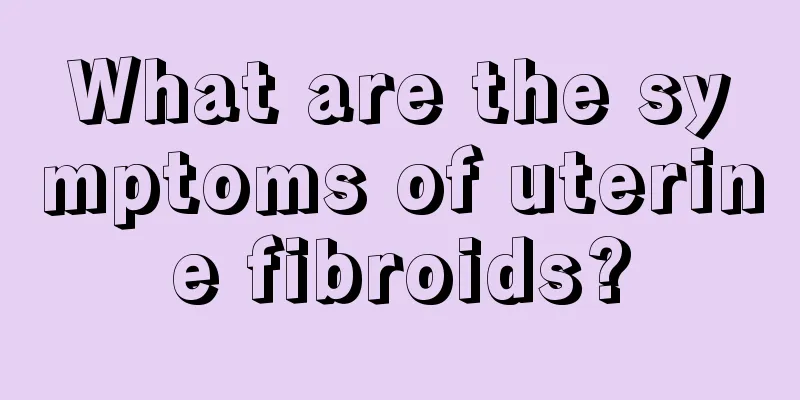What are the symptoms of uterine fibroids?

|
Most female friends will have some gynecological diseases to some extent. The milder ones are probably gynecological inflammation. If you pay attention to your daily hygiene and eating habits, you will recover quickly. However, there are some more serious gynecological diseases, such as uterine fibroids. Although uterine fibroids are benign tumors, they also need timely treatment. So what are the symptoms that will tell you that you may have uterine fibroids? Menstrual irregularity is the main symptom of uterine fibroids, which is mainly manifested by heavy menstrual flow, prolonged menstrual duration, irregular menstrual cycle, prolonged menstrual period, etc. In severe cases, it can lead to anemia in patients. In addition, postmenopausal patients with uterine fibroids occasionally experience vaginal bleeding symptoms. Postmenopausal bleeding may also be caused by cervical cancer or endometrial cancer. Patients with uterine fibroids may suffer from severe lower abdominal pain due to ovarian rupture or infection, ovarian tumor torsion, prolapse of submucosal uterine fibroids from the cervical os, or fibroid degeneration. Uterine fibroids can grow in any part of the reproductive organs. Patients with uterine fibroids may feel a lump when touching their abdomen. Uterine fibroids are extremely harmful to women's physical and mental health. In severe cases, they can affect women's normal fertility and lead to habitual miscarriage or infertility. Submucosal fibroids in patients with uterine fibroids can affect the implantation of fertilized eggs or cause early miscarriage in women. Larger intramural fibroids can cause mechanical obstruction or deformation of the female uterine cavity, which can also affect the implantation of the fertilized egg or cause early miscarriage in women. One of the symptoms of uterine fibroids is compression symptoms in women. Fibroids usually grow forward or backward, compressing the patient's urethra, bladder or rectum, causing the patient to experience problems such as polyuria, urinary retention, difficulty urinating or constipation. If the fibroids grow to both sides, they will form broad ligament fibroids, which will compress the ureter and cause water accumulation in the patient's ureter. The biggest symptom of uterine fibroids is irregular menstruation, and a significant increase in menstrual volume. There is also a feeling of oppression, which compresses the patient's urethra and causes trouble with defecation. Uterine fibroids may also cause infertility. Unmarried women need to pay attention to this aspect, and women who have just become pregnant also need regular check-ups to rule out this possibility. |
<<: What are the main causes of ovarian cysts?
>>: Why do women have trouble urinating and urinate frequently?
Recommend
What color is a girl's first menstrual period?
For adolescent girls, menstruation is a big deal....
Changes in your sex life after having a baby
Giving birth to a child is a great act for a moth...
Pregnancy pictures from 1 to 10 months
It usually takes 10 months for a pregnant woman t...
What kind of anti-inflammatory injection is good for pelvic inflammatory disease
Generally speaking, if pelvic inflammatory diseas...
How to use disinfectant at home? How to adjust the disinfection ratio of 84 disinfectant at home?
Winter and spring are the seasons when various vi...
Itchy vagina during confinement
During the confinement period, women's bodies...
My breasts became smaller after abortion
Many female friends will find that their breasts ...
Premenstrual oral ulcers
Girls always face many troubles before menstruati...
Monthly weight gain during pregnancy
Women need to pay special attention when they are...
What should women do if they feel dizzy, weak and sleepy during menstruation?
You have not experienced this before: always feel...
How do women determine whether menopause has arrived? This comparison table is very scientific
Menopause is a special period in women's live...
What are the acupuncture points for women to lose weight?
Traditional Chinese medicine originated in China,...
I don't have to worry about breast cancer because no one in my family has had it? Is breast cancer a terminal illness? The truth is...
With the improvement of living standards and heal...
What is ectopic pregnancy puncture
When ectopic pregnancy occurs, many people are no...
What should I do if granulations grow on my labia? Women can do this
When they find granulations on their labia, many ...









